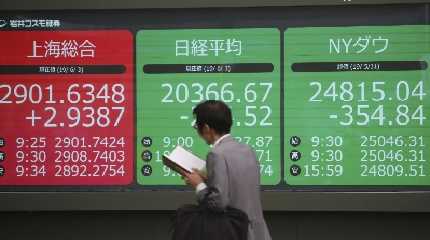
BANGKOK (AP) — Shares slipped in Europe on Thursday after gains in most Asian markets following an interest rate hike by the Federal Reserve.
U.S. futures fell, while oil prices jumped more than $1 a barrel.
The Fed’s latest hike, by three-quarters of a percentage point, lifts the benchmark short-term rate to its highest level since 2018. The aim is to bring surging inflation under control.
An update on the economy will come later Thursday with second quarter U.S. GDP data.
Analysts said that after going backward from January through March, the U.S. economy probably didn’t do much better in the spring.
Investors also are awaiting a call between U.S. President Joe Biden and Chinese leader Xi Jinping.
Germany’s DAX slipped 0.4% to 13,119.96 and the CAC 40 in Paris was down 2 points at 6,255.76. Britain’s FTSE 100 edged 0.2% lower to 7,333.16.
The future for the S&P 500 was 0.4% lower while that for the Dow industrials edged down 0.2%.
In Asian trading, Hong Kong’s benchmark Hang Seng index slipped 0.2% to 20,622.68 after the territory’s Monetary Authority matched the Fed’s 0.75 percentage point rate hike with one of its own. The HKMA aligns its policies with U.S. monetary moves to keep the Hong Kong dollar at a stable rate against the U.S. dollar.
Elsewhere in Asia shares advanced, tracking gains on Wall Street after the Fed did exactly as expected and its chair, Jerome Powell, suggested the Fed’s rate hikes have already had some success in slowing the economy and possibly easing inflationary pressures.
“While a concrete decision on tariff relief is not expected from the meeting, any indications of willingness in working toward that is an added positive for markets,” Jun Rong Yeap of IG said in a commentary.
Tokyo’s Nikkei 225 picked up 0.4% to 27,815.48, while the Shanghai Composite index added 0.2% to 3,282.58. In Seoul, the Kospi advanced 0.8% to 2,435.27.
South Korea’s Samsung Electronics Co., the world’s top producer of smartphones and memory chips, reported Thursday that its operating profit rose 12% in the April-June quarter thanks to strong demand for server chips.
Its shares edged 0.2% higher on Thursday.
Australia’s S&P/ASX 200 jumped 1% to 6,889.70 after the government reported that retail sales rose in June for the sixth consecutive month. Also, Treasurer Jim Chalmers told Parliament that the government forecasts that inflation will remain unacceptably high for some time to come and the economy will slow but not fall into recession.
Markets in Thailand were closed for a holiday.
On Wall Street, investors welcomed the Fed’s widely expected move with a broad rally on Wednesday.
Powell’s comments were taken by some as a signal the Fed may not have to raise rates so aggressively in coming months, triggering a rally in the final hour of regular trading.
The S&P 500 climbed 2.6% and the tech-heavy Nasdaq surged 4.1%, its biggest gain in over two years. The Dow Jones Industrial Average rose 1.4%. The Russell 2000 of small caps closed 2.4% higher.
The indexes are now all on pace for a weekly gain, extending Wall Street’s strong July rally. The S&P 500 is up 6.3% so far this month.
Rate increases like Wednesday’s, the fourth so far this year, make borrowing more expensive and slow the economy. The hope is that the Fed and other central banks can deftly find the middle ground where the economy slows enough to whip inflation but not enough to cause a recession.
In other trading Thursday, U.S. benchmark crude oil added $1.66 to $98.92 per barrel in electronic trading on the New York Mercantile Exchange. It gained $2.28 to $97.26 on Wednesday.
Brent crude, the international standard for pricing, gained $1.69 cents to $103.36 per barrel.
The U.S. dollar cost 135.35 Japanese yen, down from 136.55 yen. The euro rose to $1.0204 from $1.0197.




